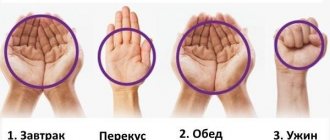What is intuitive eating and is it effective for losing weight? This article is devoted to this issue. Let's take a closer look at why:
- a non-dietary system, in which there are no prohibitions, does not lead to the consumption of industrial sweets and semi-finished products;
- what is the connection between overeating and psychological state;
- Diets in the classical sense doom us to extra pounds and suffering.
IP is offered as a technique suitable for those who do not want to count calories and are discouraged by the prospect of introducing disciplinary measures into their lives. What results can you expect and how to prepare for the program - read more.
Our additional services: Bioimpedance | Marutaka Massage | Pressotherapy | Ion-Detox
What's the point
What is intuitive eating - if it is not a diet, not a set of restrictions, then how can you get rid of excess weight using this principle? The fact is that this system suggests reconsidering your relationship with food and making it healthy and harmonious.
Nutritionist's comment:
The problem of obesity is often not only an unhealthy diet, but also largely psychological distress. Excess subcutaneous fat is largely the result of compulsive overeating, when we try to improve our emotional state through tasty foods. And this method works, but not for long. Within 15 minutes after eating chocolate, a feeling of guilt also appears.
Is it possible to lose weight on intuitive eating? Many people are surprised when they learn that there are no restrictions. Indeed, the system does not involve dividing foods into healthy and harmful, and there is also no need to weigh portions and count calories. What then will change in comparison with the lifestyle that led to obesity? To get results, you need to learn to be attentive to your body and recognize the signals of hunger and satiety. What changes should penetrate your life and become an unchanging rule:
- food is not a way to improve your mood, you will have to break the vicious circle of enjoying desserts when you are blue;
- You can only eat when you are hungry;
- choose foods that you really want;
- eat slowly, enjoying the taste, temperature, consistency, and appearance of the dish;
- listen to how the body is saturated, what sensations accompany it;
- pay attention to the discomfort that appears due to overeating;
- try to tempt yourself infrequently with foods rich in flavor enhancers, as they make our appetite unnatural.
As a result, you should develop a healthy relationship with food, and this will be the key to a stable low BMI. After all, if there are no restrictions, then there are no breakdowns. This means that you will not have to go through a sharp weight gain again - these fluctuations will be a thing of the past. The absence of violence against oneself is what distinguishes intuitive eating from conscious eating. Such a system can be a real salvation for people who cannot tolerate restrictions and react poorly to attempts to discipline themselves.
Bodymaster.ru recommends Fitness Trainers:
Emotional – a false type of hunger that occurs during strong emotional manifestations: sadness, resentment, anxiety, boredom. In this case, there is no physiological need.
The feeling is born in the head, demanding encouragement in the form of a treat - chocolate, fast food, fatty foods, etc. Uncontrolled absorption of high-calorie foods leads to a set of extra pounds.
Identification of the type of hunger will make it possible in the future to systematically reduce the percentage of subcutaneous fat.
Advantages and disadvantages of the approach
The skills of determining true hunger and satiety contribute to:
- stabilization of blood pressure;
- reducing bad cholesterol;
- increased comfort - you don’t have to carry several containers with you to work or school, as required by fractional meals;
- lack of attachment to meals before training - will simplify the process of planning and organizing personal time;
- simplifying the organization of the day - there is no need to keep an intuitive eating diary, create a grocery basket, or cook in advance.
However, permissiveness can turn into failure:
- Established eating habits make it difficult to determine the type of hunger, which forces you to satisfy your appetite more often than necessary;
- not suitable for people with weak willpower due to the high risk of relapse;
- imbalance of BJU leads to gastrointestinal disorders, exacerbations of chronic diseases, and deterioration of health in general;
- not suitable for beginners - for weight loss it is important to correctly calculate the calorie content of the diet and create a deficit of energy supplied from food, which is impossible when determining portions “by eye”;
- not suitable for heavy sports – intensive, high-volume training requires a sufficient amount of energy and macronutrients, which cannot be calculated without counting the food consumed.
How to distinguish between physical and emotional hunger
The intense rhythm of life and stress factors make it difficult to distinguish physical hunger from emotional hunger. Recognition factors:
- frequency of meals - 30-60 minutes after a heavy lunch, the body cannot starve again, since it takes more than three hours to digest food. Therefore, the emerging appetite refers to imaginary hunger;
- emotional states: sadness, anxiety, boredom, loneliness, procrastination - causes a desire to eat. Activities and actions that will help distract you from false hunger will help you get out of the trap of emotions;
- sense of smell – if you feel the odors from establishments with fast food, baked goods, or sweets, you want to eat, then you need to imagine a healthy meal. If your appetite does not work up when you think about a piece of meat with a portion of complex carbohydrates or a salad, then these are false urges;
- uncertainty that it is time to eat - if you are in doubt, then a couple of glasses of water and a small task for 10 minutes will help answer the question. The return of hunger indicates that it is really time to eat. Otherwise, it seemed to you.
Slow down, take a break from work and household chores for a few minutes to assess your psychological and emotional state. This is necessary in order to better begin to understand your own body and needs. Losing weight and intuitive eating require paying attention to your own desires in order to make the right decision.
Who invented
The model began to take shape in the 70s on the North American continent. The non-diet approach at its core has become a hope for those who have been too susceptible to relapse and weight gain. Nutritionists and psychologists have observed a pattern: the more you control yourself, the more you crave forbidden foods. And at one moment, when we experience serious stress, we can break down and reduce all efforts to zero.
The absence of an irresistible craving for your favorite delicacy, a healthy attitude towards the dish - this is what intuitive eating means. This approach was practiced by American Teyma Weiler. Its effectiveness and growing popularity in narrow circles became the basis for the opening of a center where women who wanted to lose weight stopped torturing themselves with diets and got the desired result.
In the late 70s, a book on the psychology of weight loss, Overcoming Overeating, was published, and then this topic is addressed in the popular publication Fat is a Feminist Issue. This is how ideas about the wisdom of the body, which is able to properly regulate appetite without conscious control, become known in society.
In 1995, the fundamental work of nutritionists E. Triboli and E. Resch, “Intuitive Eating,” was published. Here you can find structured detailed information about the technique, its effectiveness, validity and excellent results. Professor Stephen Hawkes brought widespread fame to the system. He tested its effectiveness on himself, losing more than 20 extra pounds without effort, which never returned to him.
Indeed, research on this approach demonstrates that those losing weight intuitively show enviable stability - their body mass index remains consistently low for a very long time. Followers of the method claim that slimness remains with a person forever, this is another important advantage over conscious nutrition.
Nutritionist's comment:
There is an opinion that nature itself came up with a non-dietary method, but due to a perverted attitude towards food as a result of the development of civilization, people have lost the ability to hear the signals of their body. But this is not entirely true, because in fact, eating behavior in ancient times was not controlled by sensations (of hunger and satiety), but by supply. Food, it should be fairly noted, was a resource difficult to obtain, so it was consumed when available, even beyond measure. This explains the fact that overweight people have been considered the standard of beauty and prestige for many centuries. Slimness came into fashion not so long ago.
Intuitive eating is not about slimness, but about health
Are you ready to accept that your body knows best what weight it is comfortable at? If so, intuitive eating is definitely for you. By forgetting about food restrictions, you will instantly reduce your level of nervous tension. This will have a beneficial effect on your appearance and well-being. True, it is possible that your new look may not meet the glossy standard of beauty. When conceiving a person, nature had no idea that the strategic reserve of fat cells would be called cellulite and declared an enemy.
Seriously though, conscious and full of respect for yourself and your body actions on the plate, as clinical experience shows, in most cases lead to weight normalization. For many people, this means losing weight. For some, on the contrary, size M. For girls accustomed to dietary behavior, it is difficult to accept such rules, but in general it is very useful: as the latest scientific data show, a body mass index slightly higher than normal directly correlates with longevity.
How to lose weight using intuitive eating - basic principles
What rules do you need to bring into your life in order to forever forget about exhausting mono-diets and find a slim body?
Complete rejection of diets of any kind
As long as you believe in a diet program that is based on strict restrictions but can lead you to your ideal result, you will not succumb to IP. There is no special sequence of foods, there is no need to endure a feeling of acute hunger for several days - you should be comfortable.
Respect for your body
Recognize that people are created different; striving for a single standard is madness. The important task is to change so that you feel good, be active, and energetic. But if you want to get some specific parameters that will ensure you the admiration of men and the respect of girlfriends, then you need to work on motivation. Learn to respect your body, treat it as an asset - with care and understanding.
Weakening and eliminating dietary control
The basic principles and rules of intuitive nutrition follow from the wording - obey your intuition, and not various tables from smart books. This is not about consuming unhealthy amounts of chips and chocolate, but about stopping criticizing yourself for excesses. If at first there is a place for them, then later they will disappear. After all, the body has wisdom, it knows what and in what quantities it needs to maintain normal weight.
Learn to hear your hunger
Despite the fact that this postulate sounds simple and even primitive, it will not be easy to comply with. After all, we are accustomed to taking the following states as a desire to eat:
- thirsty;
- sadness;
- stress;
- the desire to belong to a group - many had to eat something “for company”;
- fatigue - when it is necessary to take a break from work;
- procrastination - when you have to do something you don’t want to do.
All this should be filtered out. Eat when you are really hungry - this should be the only motivation for eating. It is possible that you will need several sessions with a psychotherapist to learn to distinguish between a true desire to eat and a compulsive unhealthy state when food is perceived as a way to distract from problems.
Treat food without prejudice or hostility
One of the 10 principles of intuitive eating will also require effort, as many have spent years and even decades with the strong belief that food can be the enemy. Remember how many negative attitudes exist, and imagine how much strength they gain, becoming entrenched in our consciousness. We understand the harm of excess sugar and fatty foods. We imagine how the volume of the body increases after salted and smoked food. We count the number of kilometers that need to be run after eating chocolate. All this eventually becomes a real war on food. It should be completed if you decide to learn how to switch to intuitive eating and do it in practice.
Learn to hear and respect the feeling of fullness
Shift your attention from the taste and texture of the dish to your sensations. Saturation comes gradually, your condition changes. Many people prone to overeating eat quickly, anxiously, remaining captive to their problems, tasks and daily routines. In such a situation, we notice a change in state only when we have eaten too much. There is a feeling of heaviness, drowsiness, heartburn, and only then do we stop. There is no need to do this. Listen to your body, don't be distracted by vanity. And then you can track how the feeling of fullness gradually comes.
Feel pleasure and satisfaction
When you learn to fully enjoy food, not sneakily, without guilt, but “legally,” a very important change will occur. To reach the moment when you are satisfied, you will need less goodies compared to previous portions. It's amazing how your appetite changes if you remove inhibitions and allow yourself to enjoy your meal.
Respect your feelings
How to understand whether you are hungry or trying to “eat” irritation - intuitive eating involves a healthy attitude towards your emotions. This practice should teach you to treat your psychological state and reactions to others without criticism. Don't suppress, monitor, accept, treat yourself with understanding.
There is no need to strictly evaluate your body
Your physique depends not only on diet and exercise, but also on genetics. Give up the desire for an unattainable standard - such ambitions not only do not help, but also cause nervous exhaustion and loss of self-confidence. Respect and love yourself, only in such conditions can you successfully switch to intuitive eating without violence, learning to listen to your body and not obey public opinion.
Value your health
It is important to choose foods and intensity of physical activity so that the result is comfort. Don't think that this technique involves anyone eating chips and cakes as the main course. If you listen to the body and strive for a pleasant state, then these delicacies will sink into oblivion, since they cause heaviness, indigestion and even cutting pain. The same applies to training - you don’t need to set yourself impossible tasks and perform boring sets to the point of exhaustion and severe soreness. Look for a middle ground.
Why don't diets work?
The idea of intuitive eating is opposed to the well-known and extremely common dietary approach. Most likely, everyone reading this article has had experience with dieting. If not, then, for sure, everyone has had to deal with a person on a diet at least once in their life. Initially, diets were prescribed solely for medical reasons (lactose or gluten intolerance, stomach and intestinal diseases, etc.), but very quickly they spread far beyond the boundaries of medicine. Diets have become a panacea for those who want to lose weight; people trying to lead a healthy lifestyle began to go on diets; diets for athletes, pregnant women, and nursing mothers appeared. However, recent studies show that the effectiveness of diets is greatly exaggerated, and moreover, dieting can lead not to weight loss, but to weight gain and even deterioration of health.
Set point and yo-yo effect
Diets promise that a person can have any body they want, regardless of gender, age and other individual characteristics. However, this is not true. A person’s weight is determined primarily by genetics and the level of basal metabolism, that is, it represents a more or less constant value called a set point. Set point is not a rigidly fixed number, but a range of 2-5 kg. Weight tends to return to the set point after any physiological shock: pregnancy and childbirth, diet, intense physical and mental stress. When the body is at set point, it functions most optimally. The person feels well, rarely gets sick, and gets tired a little. Even if he sometimes overeats, this does not affect his set point in any way. Simply, his metabolism speeds up and excess calories are burned.
What happens when a person goes on a diet?
Almost any diet is based on limiting the consumption of fats and simple carbohydrates, as well as actively removing fluid from the body. Therefore, any diet sooner or later gives results: a person loses several kilograms. However, most often these kilograms (and usually even more of them) return after some time. The fact is that when limiting the amount of food consumed, the human brain turns on starvation mode. It is characterized by a slowdown in metabolism, lethargy, drowsiness, reluctance to engage in physical activity, and most importantly, the body’s attempts to retain any calorie that enters it, that is, any free calorie is converted into fat. When dietary restrictions are lifted, the body tends to return to its genetically determined set point and store as much fat as possible for another rainy day. Thus, a person who decides to go on a diet falls into a trap: instead of setting his body up to lose weight, he sets himself up to gain it, but this gain will happen a little later, when the period of dietary restrictions ends. This phenomenon is called the “yo-yo effect.” A yo-yo is a children's toy, a ball on a string that can be spun with one movement of the hand, but thanks to the tension of the string, it always comes back. Likewise, a person who is constantly on a diet loses weight, which always comes back.
Moreover, the yo-yo effect works in such a way that each new dietary attempt becomes less and less effective. Usually the first diet is easily tolerated and gives significant weight loss, the second diet is less tolerated, but still leads to success, but with each subsequent attempt to follow the diet, it becomes more and more difficult, and fewer and fewer kilograms are lost.
Moreover, research shows that the yo-yo effect has extremely negative health consequences. First, those at greatest risk of death from cardiovascular disease are not those who are overweight, but those whose weight is constantly changing. Secondly, such people more often develop eating disorders (anorexia, bulimia, compulsive overeating) and accompanying psychological problems: they are not self-confident, they are characterized by a lack of self-esteem, increased demands on themselves, food consumption is not associated with a feeling of pleasant satiety and enjoyment of different tastes, and with a feeling of guilt for what was eaten.
the Forbidden fruit is sweet
Whatever diet we are talking about, they are all based on the idea of restriction. For example, there may be a ban on certain foods (bread, butter) or types of foods (high glycemic index foods, gluten-containing foods), total consumption may be limited (no more than so many calories, grams, fists), time restrictions may be imposed meal (do not eat after six, eat after three hours, do not eat between main meals), it can be clearly written down what meals can be eaten and on what day of the week. The problem with this approach is that it does not take into account the basic property of the human psyche, namely, an extremely negative attitude towards any prohibitions and restrictions. It is no coincidence that imprisonment has become the main way of punishing a person for a crime. So, a diet is a personal prison, from which you will definitely want to break out.
When a person first starts a diet, he usually experiences euphoria. Motivation is high, the effect of novelty is effective, even the most insignificant results are pleasing, and there is a buzz from the effect of control over your own life. Unfortunately, after some time, motivation decreases, the novelty effect disappears, it becomes more and more difficult to achieve some results, and you get the feeling that you are constantly being controlled. Imagine that you have been given a palace in which you can arrange everything as you want. At first you will experience great pleasure arranging furniture and distributing rooms. But if after a week it turns out that you can’t leave the palace anywhere, this will cause you to protest, apathy, and depression. Diets work the same way. By prohibiting ice cream and buns, the diet provokes a person to constantly think about them, dream about them, and really want them. As a result, the human psyche organizes a riot: “Fuck it all. I'm an adult, I can afford this bun! I deserve this cake!” When a person has already relapsed, then usually he is no longer limited to one bun or a piece of cake, because tomorrow he will have to go back to diet prison again, so you need to take everything from the relapse. Thus, dieting leads to an increase in episodes of overeating, and therefore to weight gain in the long term.
Here many people must ask: “Okay, but if diets don’t work, then what should those who want to lose excess weight do?” Within the framework of the intuitive approach, we are not talking about losing weight, but about normalizing it, that is, leading to a genetically specified set point. To achieve this, you need to normalize your relationship with food, and to normalize your relationship with food, you need to:
- Find out how you eat (your eating style);
- Allow your body (the feeling of hunger and satiety) to guide the amount of food eaten, the timing of meals, and the choice of food.
I will tell you about this in more detail now.
How much can you lose in a month on intuitive eating?
You should not expect quick results from this approach. Perhaps in the first weeks the changes will be very minor, they may even be absent altogether. Or even the scale arrow will swing to the right, indicating an increase. But remember that a slower pace of weight loss means a more stable outcome. Also, exact numbers are hampered by such circumstances as individual characteristics. Some will lose 1.5 kilograms a week on IP, while others will get rid of 5 kg in a month.
But if the technique can be mastered, then the problem of excess weight will be solved forever.
How to switch to intuitive eating and lose weight
In order for this approach to bring a positive result and not disappointment, attention should be paid to the following aspects:
- learn to eat mindfully;
- increase sensitivity;
- be guided by your own desires when choosing products, and not by the recommendations of magazines and nutritionists;
- do not allow severe hunger;
- pay attention to the stages of saturation;
- notice the state when your body is sufficiently saturated, you feel good, filled with energy, but you can eat more - this is the moment when you should stop.
Intuitive eating is not about rules and restrictions, but about learning to listen to your body.
Intuitive eating: reviews from those who have lost weight
On the Internet there are mostly positive reviews about the intuitive nutrition system. People note that they managed to get rid of excess weight without exhausting diets and fasting. Here are the reviews of intuitive eating from those who have lost weight:
The intuitive nutrition system is suitable for those who dream of learning to live in harmony with their body and not exhaust themselves with constant diets and fasting. For those who need to lose weight in a short time, we recommend reading the article: How to lose 7 kg in a week and How to lose 10 kg in a week and get rid of your belly and thighs.
Author: Olga Vasilyeva. Photo: Instagram, StarTikTok, YouTube. If you are the author of one of the photos and do not agree with its publication, contact the administration and we will correct the error.
Stages of transition to individual entrepreneurs
This process cannot be simple and quick, since it requires a fundamental restructuring of consciousness and a qualitatively different attention to one’s body. This is unusual. Therefore, we come to the technique gradually, we list the stages:
- Denial - there is no need to radically change your approach, you can go on your usual diet and quickly lose weight to the desired level.
- Contemplation - after several episodes when the diet program did not bring the desired changes, but, on the contrary, caused harm, many begin to doubt the advisability of the restrictions. At this moment, information about intuitive eating attracts, I want to find out what it is and how to start using a comfortable method.
- Preparing for action is not yet a full-fledged transition, but rather attempts to change habits: a person eats more slowly, tries to look at “forbidden” foods without bias, and monitors changes in his emotional state.
- Action - This is where practice begins. The ability to recognize body signals becomes more confident, and respect for one’s physique and mental processes also grows. Food ceases to serve as a comfort, but serves only as a source of energy, as it should be.
Principle 1: Giving up control
At this stage, Svetlana Bronnikova advises learning to correctly recognize the feeling of hunger. What does it mean? You must understand where you feel this hunger. Press your hand to the place where the emptiness is felt most strongly. If it's the stomach, then everything is fine. If it is a little higher, closer to the chest, then you are not experiencing physical hunger, but anxiety. And you eat exactly that.
When you feel hungry, break it down into symptoms. How do you feel when you are hungry? Is your stomach growling? A sucking sensation in your stomach? Weakness? Loss of consciousness? Does it get dark before your eyes? If you show the last three signs of hunger, it means that you do not know how to detect hunger at the very beginning and are driving your own body to the extreme.
What to do with all this? Keep a food diary! Svetlana advises creating a private Instagram account where you can take pictures of everything you ate during the day. And make captions - when you ate it and why. Mom forced me, for the company, I wanted it. Based on this data, you can work with setting hunger and satiety signals.
How to maintain a healthy lifestyle
The more dietary experience a person has, the stronger the beliefs about strict diet control, the more likely a breakdown is. Maintaining IP in such a situation will require more effort and attention.
To successfully maintain your favorite menu within the framework of intuitive eating and make progress in losing weight, it is recommended:
- find like-minded people who would share their experiences;
- get support - put your friends, relatives, and spouse in a positive mood;
- notice changes, do not downplay the importance of even small improvements;
- Be patient - you won’t be able to implement all the principles and lose weight right away.
It is believed that the development of IP occurs in a spiral, so it is quite normal when episodes of regression are noted.
How to respond to a breakdown
Nutritionist's comment:
Only 5% of those who decided to switch to a non-diet model went towards their goal systematically. For the vast majority, this transition to intuitive eating included both confident steps forward and unfortunate failures. But on this path it is important to give up the habit of criticizing yourself and demanding the impossible.
Gradually, after several failures and a return to the beginning of the path, sustainable changes in consciousness and behavior are formed. They warn against overeating on a qualitatively different level - and it will stay with you for life.
The most common mistakes in IP
We remind you that this method will require awareness and preparation. The following reasons can prevent you from achieving the desired results:
- rush;
- permissiveness;
- setting the wrong goals (for example, losing weight to 70 kg in 2 months);
- activity of the inner critic;
- disrespect for one’s own body and emotions, the desire to restrain one’s reactions, to switch attention (to food);
- the need to do things you don’t like and communicate with unpleasant people.
Look at our Clients' Acknowledgments and Success Stories – View
To avoid such mistakes, it is necessary to clearly develop steps and goals. Specialists from Elena Morozova’s clinic will help you with this. They know everything about a healthy lifestyle and proper nutrition and will provide recommendations on how to properly lose weight without harm to the body.









